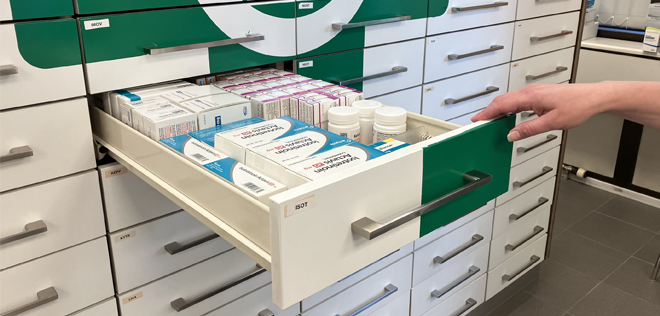Study: Savings in pharmaceutical expenditures are possible by increasing customers’ financial incentives

Customers are more likely to choose a cheaper drug if they have to pay out of pocket for refusing generic substitution. The greater the financial incentives for generic substitution, the larger the savings, according to a new study analyzing generic substitution and reference price policies in Nordic countries.

According Kela, the Social Insurance Institution of Finland, pharmaceutical reimbursements have increased year on year. In 2022, Kela paid out 1.8 billion in these reimbursement expenses. During the past 20 years, pharmaceutical reimbursements by Kela have doubled. According to the Finnish Medicines Agency Fimea generic alternatives can be even 70 to 90 % cheaper than the original drug. However, generic substitution is only possible if the customer agrees to it.
Researchers from the VATT Institute for Economic Research, Aalto University, University of Turku, Helsinki Graduate School of Economics and the Finnish Institute for Health and Welfare investigated how different generic substitution and reference price policies used in Nordic countries affected pharmaceutical expenditures and the availability of pharmaceuticals. They analyze how policy changes affect expenditure per daily dose, drug prices and other market outcomes. The study finds that policies that give consumers incentives to choose cheaper drugs can generate significant savings without affecting the availability of drugs.
"Based on our study, the Finnish reference price system has generated significant savings in pharmaceutical expenditures. However, the current system could be improved by enhancing customer incentives and by otherwise steering their choices towards cheaper alternatives. When revising policies, it is important to ensure that the changes do not decrease the availability of drugs", says senior researcher Markku Siikanen from the VATT Institute for Economic Research.
Financial incentives steer choices towards cheaper alternatives
Since the 1990’s, Finland and other Nordic countries have had policies in place to curb pharmaceutical expenditures by providing consumers incentives to choose cheaper products. In 2003, Finland adopted a generic substitution policy, which enabled pharmacies to substitute prescribed drugs with cheaper interchangeable products, unless the doctor has explicitly forbidden substitution. Based on the study, this policy had little impact on pharmaceutical expenditures.
In 2009, Finland adopted a reference price system, where each drug is assigned a reference price. Consumers are reimbursed on the basis of the reference price irrespective of the product they choose. If the price of the product chosen by the consumer is higher than the reference price, then the consumer must pay the price difference fully out of pocket in addition to the copayment. Following the reform, expenditure per daily dose dropped by 13 percent, without affecting availability.
"Our research shows that financial incentives do matter. In Nordic countries, pharmaceutical expenses are generously reimbursed as a part of the social security system. This can decrease the consumers’ incentives to substitute towards cheaper alternatives, unless the policies in place actively encourage them to do so", says Markku Siikanen.
Improving financial incentives could bring additional savings
The study examines six different consumer choice policies used in Nordic pharmaceutical markets. During the observation period, all the Nordic countries had a policy in place for generic substitution. The ways of steering consumer choices varied from simply providing price information to various financial incentives. The strictness of the policy is defined by the financial incentives in place and how they affect the reimbursement consumer receives if the consumer does not choose a cheaper alternative.
In the reference price system used in Finland since 2009, the consumer must pay the difference between the price of the chosen product and the reference price. Sweden has had a much stricter auction-based system in place since 2009. In this system, only the product which wins the monthly auction is reimbursed, with some exceptions.
The stricter system adopted in Sweden reduced expenditure per daily dose by 29 percent without affecting the availability of pharmaceuticals during the observed time (36 months). A substantial part of the savings can be explained by changes in consumer behavior because the effect of the policy change on wholesale prices was modest in comparison to the impact on expenditure.
"Our research shows that savings in pharmaceutical expenditures are mainly driven by demand reallocation and improving price competition only plays a modest role. For this reason, in evaluating regulation for pharmaceutical markets, the focus should be on cost savings and other market outcomes, not just price changes", says Markku Siikanen.
Evaluating regulation changes in the Nordic pharmaceutical market
The researchers examine policy changes in Finnish, Swedish, Danish, and Norwegian pharmaceutical markets. By comparing identical markets in country implementing a policy change to a country, where no changes are taking place, the researchers establish a quasi-experimental research design which allows them credible evidence on the impact of policy changes on expenditure per daily dose, drug prices and other market outcomes. The study analyses six different policy reforms.
Instead of looking at individual products, the study looks at markets consisting of products containing the same active substance. The number of markets included in the analysis varies from 15 to 112 per studied reform. The studied markets account for 3.5 to 26 percent of the total retail market sales in studied countries’ pharmaceutical markets. The study uses extensive wholesale market data from the Nordic countries.
Research publication:
Mika Kortelainen, Jaakko Markkanen, Markku Siikanen ja Otto Toivanen (2023) The Effects of Price Regulation on Pharmaceutical Expenditure and Availability. VATT Working Paper 157.
More information:
Senior Researcher Markku Siikanen, VATT
[email protected]
+358 295 519 505
Markku Siikanen
Mika Kortelainen
Healthcare services
Local public finance and provision of public services
Press release
Uutiset ja tiedotteet
health economics
healthcare
healthcare reforms
healthcare services
pharmaceutical markets

